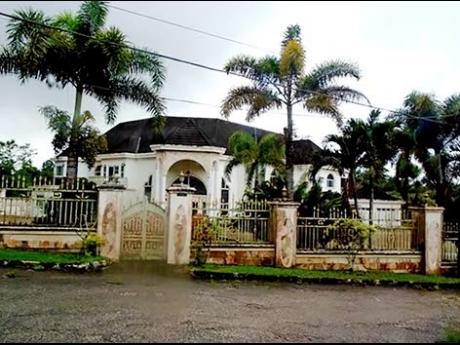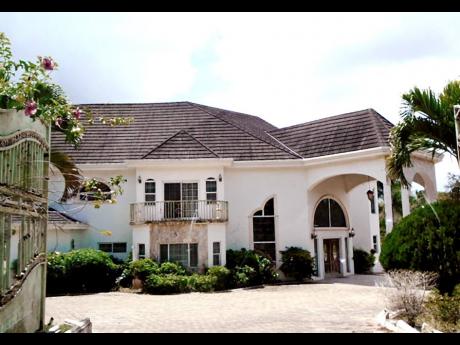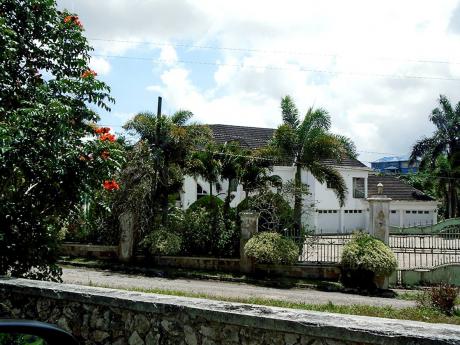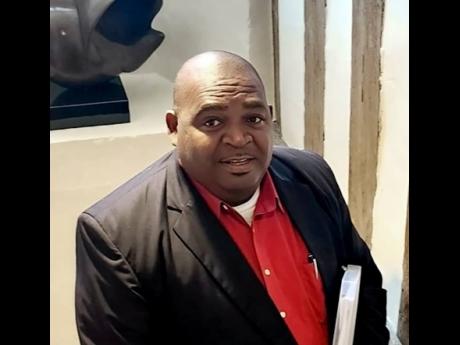Billion-dollar takedown
- Law enforcement topples vast empire of cop-turned-drug dealer - It took investigators 15 years to unravel his ‘complicated’ scheme
A palatial house valued at US$1.55 million, or approximately J$230 million, is among the last remaining assets billionaire drug dealer Andrew Hamilton has been ordered to turn over to the Government. And, already, the Assets Recovery Agency (ARA)...
A palatial house valued at US$1.55 million, or approximately J$230 million, is among the last remaining assets billionaire drug dealer Andrew Hamilton has been ordered to turn over to the Government.
And, already, the Assets Recovery Agency (ARA) has begun the process to have Hamilton’s name removed from the title for the sprawling mansion in Mandeville, Manchester, which he purchased for US$980,000 in 2011.
Similar steps are being taken with four other properties worth a total of nearly J$100 million, which authorities believe the convicted drug dealer purchased then registered in the names of family members and associates or transferred to fictitious persons, the Financial Investigations Division (FID) has confirmed.
One of them, located in Ironshore, St James, has an estimated market value of US$350,000, or approximately J$54 million, according to the last valuation.
The FID, which falls under the Ministry of Finance, is the agency mandated in law to enforce Jamaica’s Proceeds of Crime Act (POCA), the legislation designed to deprive criminals of their ill-gotten gains. The ARA is its enforcement arm.
‘NOT ACQUIRED THROUGH LAWFUL MEANS’
The Supreme Court, in a decision handed down in August, ordered that the five properties should be forfeited to the State, declaring that the ARA had presented sufficient evidence to draw the clear inference that “they were not acquired through lawful means”.
“There is sufficient evidentiary basis to support the claimant’s [ARA] contention that the properties were acquired through unlawful conduct. It is of note that there is no challenge to any of this evidence,” presiding judge, Justice Stephane Jackson-Haisley, said in her 23-page ruling.
“The material before me is uncontroverted.”
Five other houses, worth a total of J$165 million, which were linked to Hamilton but registered in the names of family members and persons believed to be non-existent, have been excluded from the court order for now.
Two of Hamilton’s children, one of them a minor at the time of the purchase, and their mother, were listed as joint owners of three of the properties, valued at US$600,000, or approximately J$130 million, according to estimates provided by the ARA in court documents seen by The Sunday Gleaner.
Jackson-Haisley said the houses are “not recoverable at this time” because service of court documents related to the case were “not proper”.
The other two properties, the judge said, would have been recoverable “except that I have found that the listed proprietors [names redacted] were not properly served”.
“For that reason, those properties are not recoverable at this time.”
The FID plans to appeal this decision, the agency said last week in response to questions submitted by The Sunday Gleaner.
TOTAL COLLAPSE OF EMPIRE
Jackson-Haisley’s ruling marks a total collapse of Hamilton’s staggering portfolio of assets, which was initially valued at approximately J$1 billion.
It included 30 homes in mostly upscale communities across six parishes, luxury cars, a fishing vessel, and construction equipment and cash, all acquired between 1998 and 2012, according to the ARA.
His empire began to crumble last September when he was ordered by the Supreme Court, in another ruling, to forfeit nearly J$500 million worth of assets to the Government, including a penthouse suite and two apartments in the upscale neighbourhood of Norbrook, St Andrew.
That ruling also covered 14 homes, including six apartments in a gated apartment complex, also in St Andrew; four motor vehicles; four bulldozers; the fishing vessel purchased for $19 million; and a bank account containing $19 million, The Sunday Gleaner reported last October.
The United Kingdom Privy Council, Jamaica’s final appellate court, affirmed that ruling in a decision handed down last Monday.
Hamilton’s entire asset portfolio is now under the control of the FID and will be disposed of through competitive bidding, the agency’s principal director Keith Darien disclosed to The Sunday Gleaner on Friday.
He said the judgment marks the culmination of 15 years of investigation and litigation of the “complicated” scheme Hamilton, a former Jamaican cop and postal worker, used to launder his ill-gotten gains and keep his portfolio of assets hidden from local financial investigators.
“This case demonstrates the effectiveness of the Proceeds of Crime Act in depriving persons of illicit wealth,” said Darien, lauding the resilience and determination of the agency’s financial investigators and the “tenacious” legal skills of Caroline Hay, KC, the attorney who represented the ARA.
He disclosed, too, that the FID currently has control of assets valued at over J$5 billion which were forfeited to the Government under the POCA. It is also investigating 18 other cases involving assets worth nearly J$1 billion that were traced to persons who were convicted overseas for drug-related crimes.
“The FID is relentless in its mandate,” said Darien, warning citizens to avoid getting involved in financial crimes or purchase properties that are obtained through unlawful conduct.
“We are resolute in enforcing the provisions of POCA, and will go to the fullest extent of the law to ensure that they are prosecuted for money laundering and stripped of all their ill-gotten gains,” he said.
US$1 MILLION ANNUALLY FROM NARCOTICS TRAFFICKING
Hamilton landed on the radar of local authorities in late 2012 after he pleaded to charges of conspiracy to distribute marijuana and conspiracy to money laundering in a federal court in California, in the United States (US), according to court records of the case that ended in August this year.
He was sentenced to 54 months in a federal prison.
Hamilton was also convicted in the US in July 1998 for the sale of a controlled substance, the ARA said without indicating the sentence that was imposed.
Among the court documents was a statement from US Drug Enforcement Agency (DEA) special agent Elizabeth Dorsey, who investigated Hamilton’s crimes in California and concluded that he was “generating a million [US] dollars annually as a result of narcotics trafficking”.
Dorsey said she was never aware of the Jamaican ex-cop having any legitimate job or source of income.
Local officials said that following his 2012 conviction, the DEA requested a probe into Hamilton’s assets in Jamaica and that’s when FID investigators discovered the drug dealer’s portfolio of multimillion-dollar assets.
RUSE TO CONCEAL HIS ASSETS
A total of 13 homes, which the ARA claims Hamilton bought or facilitated their purchase, were listed in the ARA’s application for forfeiture orders in the case that was decided in August this year.
Nine were registered to persons with addresses in the US and Canada, according to the court documents reviewed by The Sunday Gleaner.
The title for Hamilton’s J$230 million Mandeville mansion was in the name of a man whose address was listed as ‘Arizona Avenue, Los Angeles, California’, the documents show.
Two houses, each valued at US$350,000 and US$300,000, were registered to a woman who gave her address as ‘Steffi Avenue, Lawrenceville, Georgia’. Two others, each valued at J$35 million, were registered to a woman who listed her address as ‘24th Avenue, Queens, New York’.
But the ARA provided a statement by Dharwin Diaz, intelligence research specialist assigned to the DEA, who was tasked with verifying the names and addresses of persons who purchased properties from Hamilton.
Diaz said all of his attempts to locate and interview the named purchasers were futile, and that none of the addresses were found on databases he utilised, supporting the ARA’s claim that it was a ruse by the convicted drug dealer to conceal his assets from authorities.
Justice Jackson-Haisley said she accepted, on a balance of probabilities, that these purchasers were “fictitious persons”.
“These properties were originally in the name of Andrew Hamilton and were transferred to the other respondents. I am of the view that, when one examines the time period within which the transfers occurred, … the inference can be drawn that it was done to divert any attention from Mr Hamilton, who at the time had already been convicted,” she said in her written judgment.
“I find that the transfers were done to conceal the extent of ownership of Andrew Hamilton. This demonstrates an attempt to conceal the true ownership of the properties,” she added.




